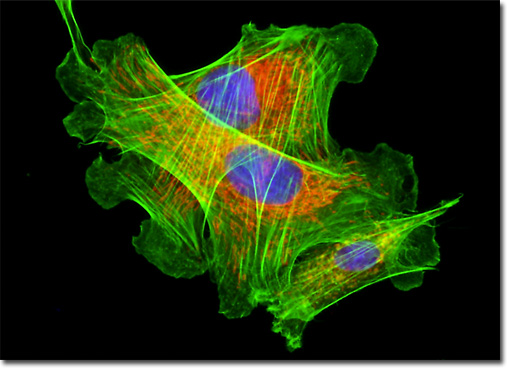Fluorescence Digital Image Gallery
Indian Muntjac Deer Skin Fibroblast Cells
|
Alexa Fluor 488 is a green fluorescent dye, which is often utilized as a substitute for more traditional fluorophores, such as Cy2 and fluorescein. Indeed, the spectra of the Alexa Fluor dye are almost identical to fluorescein probes, with absorption and emission maxima of 491 and 515 nanometers, respectively, and a fluorescence lifetime of approximately 4.1 nanoseconds. The fluorescence of Alexa Fluor 488 is pH-insensitive between pH values of 4 and 10, and the dye is relatively photostable. Alexa Fluor 488 is also water-soluble, thus no organic co-solvents are required for immunofluorescence labeling reactions. A number of bioconjugates prepared with the Alexa Fluor 488 dye are commercially available, including Alexa Fluor 488 phalloidin, which selectively stains filamentous actin at nanomolar concentrations. Indian Muntjac deer skin fibroblast cells (illustrated above) were labeled with Alexa Fluor 488 conjugated to phalloidin to target the cytoskeletal filamentous actin network, and for MitoTracker Red CMXRos to visualize the extensive intracellular tubular mitochondria. The cells were subsequently counterstained with DAPI, which targets DNA in the nucleus. Images were recorded in grayscale with a QImaging Retiga Fast-EXi camera system coupled to an Olympus BX-51 microscope equipped with bandpass emission fluorescence filter optical blocks provided by Omega Optical. During the processing stage, individual image channels were pseudocolored with RGB values corresponding to each of the fluorophore emission spectral profiles. |
© 1995-2025 by Michael W. Davidson and The Florida State University. All Rights Reserved. No images, graphics, software, scripts, or applets may be reproduced or used in any manner without permission from the copyright holders. Use of this website means you agree to all of the Legal Terms and Conditions set forth by the owners.
This website is maintained by our
|
